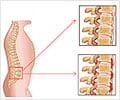Treatment and Prognosis
The focus of Reactive Arthritis treatment is
- To provide symptomatic relief by using various medications such as analgesics, Nonsteroidal anti-inflammatory drugs (NSAIDs), immunosuppressants, and steroids.
- To completely eradicate the underlying source of infection by using antibiotics. Usage of Doxycycline or tetracycline in the case of Chlamydia infection is very common
Rarely, drugs that are used to treat rheumatoid arthritis such as - Etanercept, Infliximab, or Adalimumab may be used. Occasionally drugs to suppress the immune system, such as sulfasalazine maybe used
Use of Potassium citrate solutions to relieve urinary symptoms
Joint pain may also be helped by using - Glucosamine (500 mg three times a day) and chondroitin sulfate (800 - 1,200 mg per day, divided in 2 - 4 doses)
Multi-vitamin and especially Vitamin C (1,000 - 3,000 mg a day), vitamin E (400 - 800 IU a day), beta-carotene (25,000 IU per day), selenium (200 mcg a day) may also help.
In those whose disease is mild, it is a temporary condition. In the severely affected it can lead to an array of complications such as vision loss and debilitating arthritis.
It has a higher morbidity in men compared to women. It also has higher morbidity in those who harbor inflammation but who do not respond to treatment.
However, most people with reactive arthritis enjoy a normal lifespan; with early detection, proper therapy and lifestyle modifications they have the potential to lead a near normal life.












